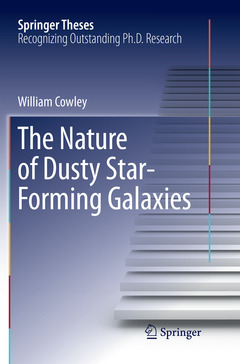Description
The Nature of Dusty Star-Forming Galaxies, 1st ed. 2017
Springer Theses Series
Author: Cowley William
Language: English
Subjects for The Nature of Dusty Star-Forming Galaxies:
Publication date: 08-2018
Support: Print on demand
Approximative price 105.49 €
In Print (Delivery period: 15 days).
Add to cartPublication date: 10-2017
Support: Print on demand
Description
/li>Contents
/li>Biography
/li>Comment
/li>
This thesis combines a theoretical model of galaxy formation with a treatment of the radiative transfer in the titular dusty star-forming galaxies. Embedding this within the well-established ?CDM (Lambda cold dark matter) cosmology, the author was able to simulate galaxy populations from which realistic observational images were synthesised. Based on further analysis, he shows that there is a good correspondence with observations from new instruments such as the SCUBA2 bolometric camera and the Atacama Large Millimeter Array (ALMA) interferometer, and reveals some novel aspects of this exciting galaxy population. In particular, he shows that blending of these galaxies in the imaging produces an artificial enhancement in their clustering, which he dubs ?blending bias?. This implies that the host dark matter halo masses for these galaxies have previously been significantly overestimated. He also presents amongst the first predictions from a galaxy formation model for observations of these galaxies that will be made by the James Webb Space Telescope (the successor to the Hubble Space Telescope).
Introduction.- The Galaxy Formation Model.- Simulated Observations of Sub-millimetre Galaxies: The Impact of Single-dish Resolution and Field Variance.- The Clustering Evolution of Dusty Star-Forming Galaxies.- The Far Infra-red Seds of Main-sequence and Starburst Galaxies.- Predictions for Deep Galaxy Surveys with JWST.- Overall Conclusions and Future Work.
Dr. William Cowley is a British scientist originally from Middlesbrough. He completed his Masters degree in theoretical physics in 2010 at Imperial College London, before spending two years as a consultant for Ernst & Young, working mainly in financial risk. He returned to academia in 2012 to begin his PhD at the Institute for Computational Cosmology, Durham University, where he was supervised by Profs. Cedric Lacey, Carlton Baugh and Shaun Cole. He successfully defended his thesis in November 2016 and is now a post-doctoral researcher at the Kapteyn Astronomical Institute, University of Groningen, working with Prof. Dr. Karina Caputi.
Nominated as an outstanding Ph.D. thesis by the Durham University, UK
Includes a novel analytical derivation of the “blending bias” effect
Is among the first predictions from a galaxy formation model for the James Webb Space Telescope
Explains novel coupling of galaxy formation and radiative transfer models
Includes supplementary material: sn.pub/extras




